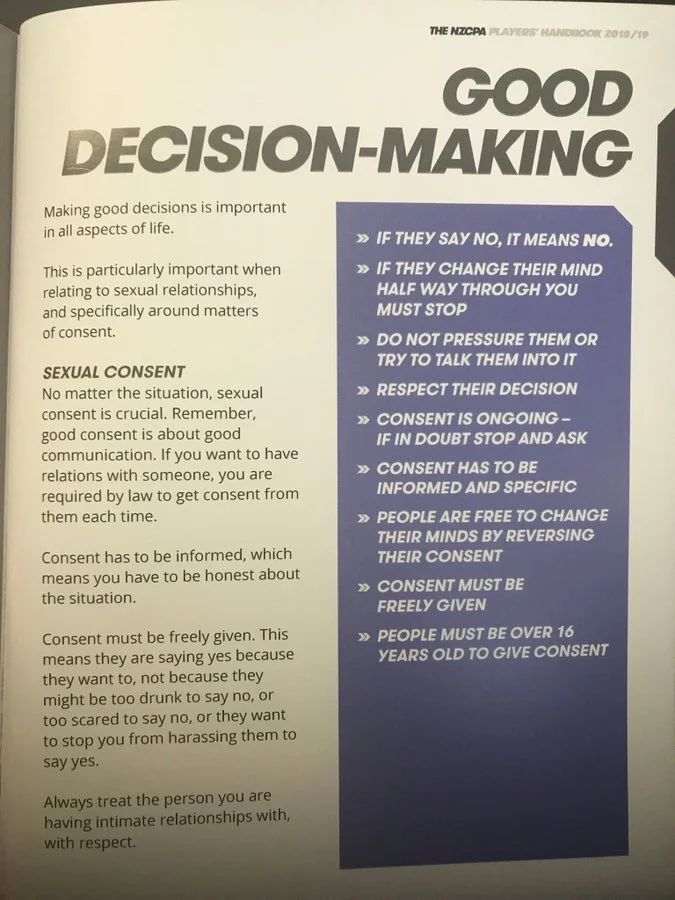⚠️Content warning: rape, sexual assault, misogyny⚠️ - attached in the spirit of informed consent
NB - I have disabled the comment function on this post. A survivor’s lived experience is not up for debate.
———
Statement 1: “He said everything was okay and then she began crying, also that he had been trying for a while and that he had finally cracked it.”
Statement 2: ”A reluctant consent is still a consent.”
Statement 3: ”I tried twice, like she might have said 'no, no' a few times but it wasn't dozens of times.”
New Zealand’s men’s squad to play England in the upcoming T20I series includes a 27 year old all-rounder from the North Island. This all-rounder has played 7 T20Is, and his name is Scott Kuggeleijn. For all the wrong reasons, he is not just any cricketer.
Scott Kuggeleijn was arrested and charged with rape in July 2015 in connection with an incident in his home town of Hamilton. His case made it to court, twice - first in 2016, when a hung jury could not return a verdict, and again in 2017 when he was not found guilty. But those three statements, all from the second trial, paint a disturbing picture of a man who firmly believes that he has done nothing wrong and is contemptuous of those who think otherwise - a man who learned nothing and grew not at all.
Statement 1 is from the survivor’s flatmate, who was called as a prosecution witness, referring to remarks Kuggeleijn made to her (the flatmate) soon after what I suppose we cannot legally call the rape - note the casual admission that the survivor had been crying, and the callous use of ‘cracked it’. Statements 2 and 3, respectively from Kuggeleijn’s lawyer Philip Morgan and Kuggeleijn himself, come from the opening of what we must technically call their defence case - but what an insubstantial and partial ‘defence’ it is. When one of the very first things you choose to say in your defence when in court accused of rape is to quibble over how many times the survivor said ‘no’, you are frankly taking the piss. And as for the concept of ‘reluctant consent’, this is to say the least a contradiction in terms. To say the most, it’s a deliberate attempt to render rape convictions effectively impossible.
Justice is hard enough to find already. Professor Jan Jordan and Dr Elaine Mossman of Victoria University of Wellington conducted an exhaustive study into rape convictions rates, poring over case files from 5 police forces across New Zealand, and determined that only 28% of cases even make it to court. Of those, only 15% result in conviction. Looking at the process as a whole, that’s 4.2% of reported rapes resulting in conviction. The reasons for this are complex and deeply culturally ingrained, not just in New Zealand but worldwide, but when defence lawyers are successfully arguing that ‘reluctant consent’ is a thing, the level of bastardry one would need to exhibit to actually be convicted of rape is extremely high.
Philip Morgan’s closing remarks to the jury are staggering. What’s even more staggering is that they resulted in Kuggeleijn’s acquittal. "She couldn't turn this man down yet again because she would then be thought of as a b*tch or a tease. My client respected the complainant's wishes at night when he could've had her so easily when she was drunk. That's not the behaviour of a rapist, is it?"
———
Because the jury acquitted Kuggeleijn, the ‘behaviour’ he exhibited that night in Hamilton is indeed not that of someone who has been convicted of rape. But he did exhibit it - the ‘behaviour’ of someone who is prepared to cajole and coerce someone into sex; the ‘behaviour’ of someone who continues to make repeated sexual advances after the person he is with says ‘no’; and the ‘behaviour’ of someone who boasts about it afterwards.
Such ‘behaviour’ should be criticised, and the person exhibiting it should be held to account and educated about its consequences and why it is (to put it mildly) unacceptable. Certainly it should not be ignored - for, as Professor Nicola Gavey of Auckland University wrote just after Kuggeleijn made his T20I debut in January of this year, “doing nothing is not a neutral position.”
And yet, a month after the second trial, Kuggeleijn was called up to a New Zealand senior men’s squad for the first time. He made his debut two months later, and this year has become a regular member of New Zealand’s T20I squad. New Zealand Cricket’s only comment on the subject was that they “respected the court process and [were] not in the business of relitigating past…[The court is] the most appropriate forum for judging matters as serious as this."
This statement, of course, completely missed the point. Nobody asked New Zealand Cricket to relitigate anything. Nobody asked them to judge the legal facts of the case. But many, many people are dismayed that someone who showed no indication whatsoever of understanding that he had done anything wrong let alone learning from it or atoning for actions that even his own lawyer described as having hurt the survivor, was rewarded with national selection.
New Zealand’s authorities, both cricketing and civil, seemed to have the Kuggeleijn case in mind in 2018. The New Zealand Cricket Players’ Association (NZCPA) for the first time included a section on sexual consent in their 2018/19 players’ handbook (pictured below). And the Wellington Police in conjunction with the Sexual Abuse Prevention Network launched a Christmas campaign telling Wellingtonians ‘Don’t Guess The Yes’. Explicit and specific consent was at the core of both.
The subtitle of this section may as well have been “Don’t Do What Scott Did.”
But this cultural shift didn’t last long. This image of the NZCPA handbook was tweeted out in October 2018 by Richard Boock, New Zealand Cricket’s Public Affairs manager. Four months later, the same man was having to apologise for the heavy-handed behaviour of stewards at the first New Zealand v India T20I at the Cake Tin stadium in Wellington, who confiscated a banner held by a spectator that said ‘No Means No’ and removed that spectator from their seat. The second T20I at Eden Park saw even more protests, including a sign directly aimed at New Zealand Cricket and several referencing the #MeToo movement.
By saying next to nothing to address Kuggeleijn’s actions, and continuing to select him, New Zealand Cricket have publicly chosen to either entirely ignore the questions of consent, appropriate sexual behaviour and misogyny, or subordinate them to cricketing concerns. Either way, they would very much prefer if everyone forgot what Scott Kuggeleijn has done and said.
But we haven’t, we won’t and we mustn’t. Kuggeleijn’s continued presence in New Zealand colours, and the institutional refusal to even begin to acknowledge its potential impact on survivors of rape and sexual violence, are distressing and insulting, and the sooner he is out of the team the better.


